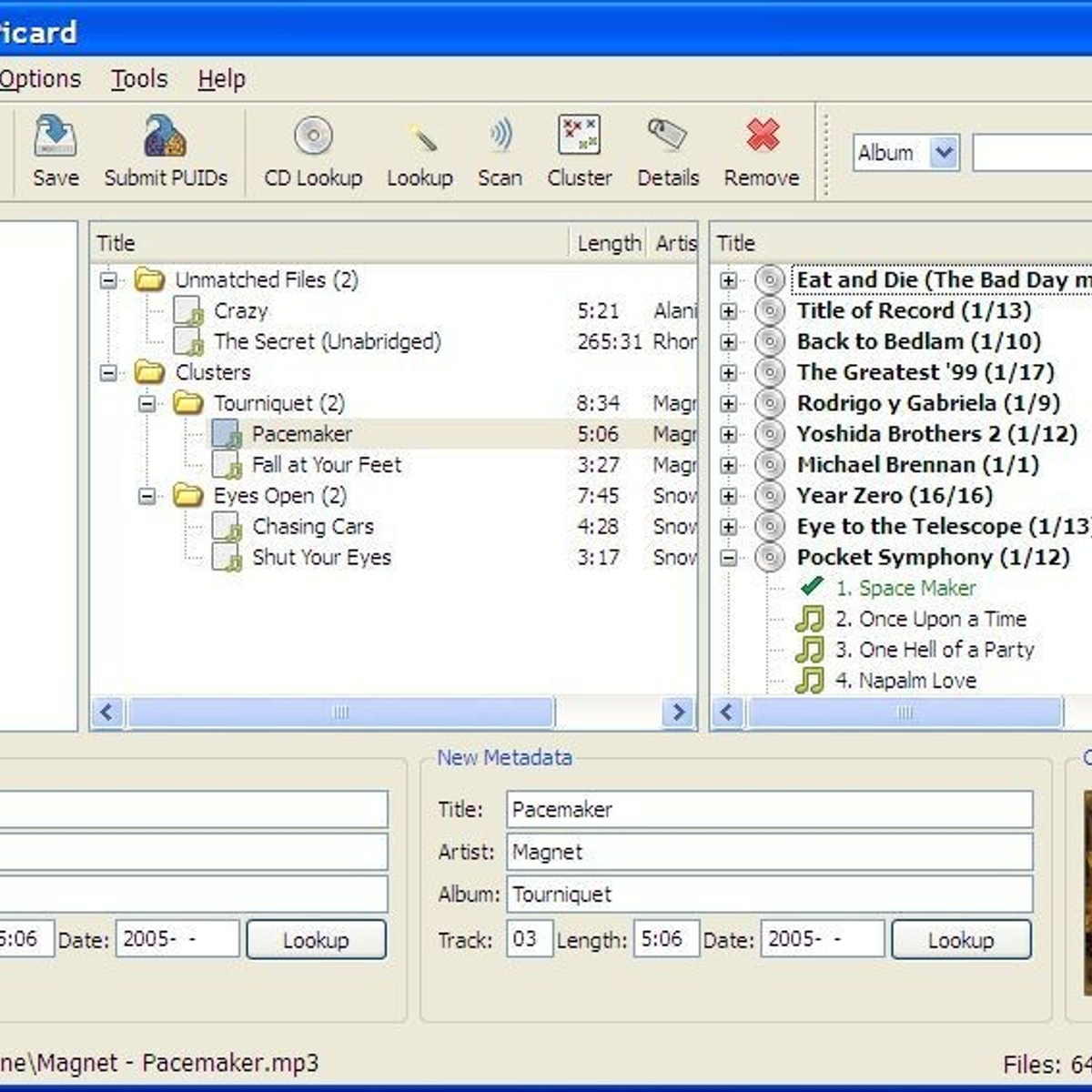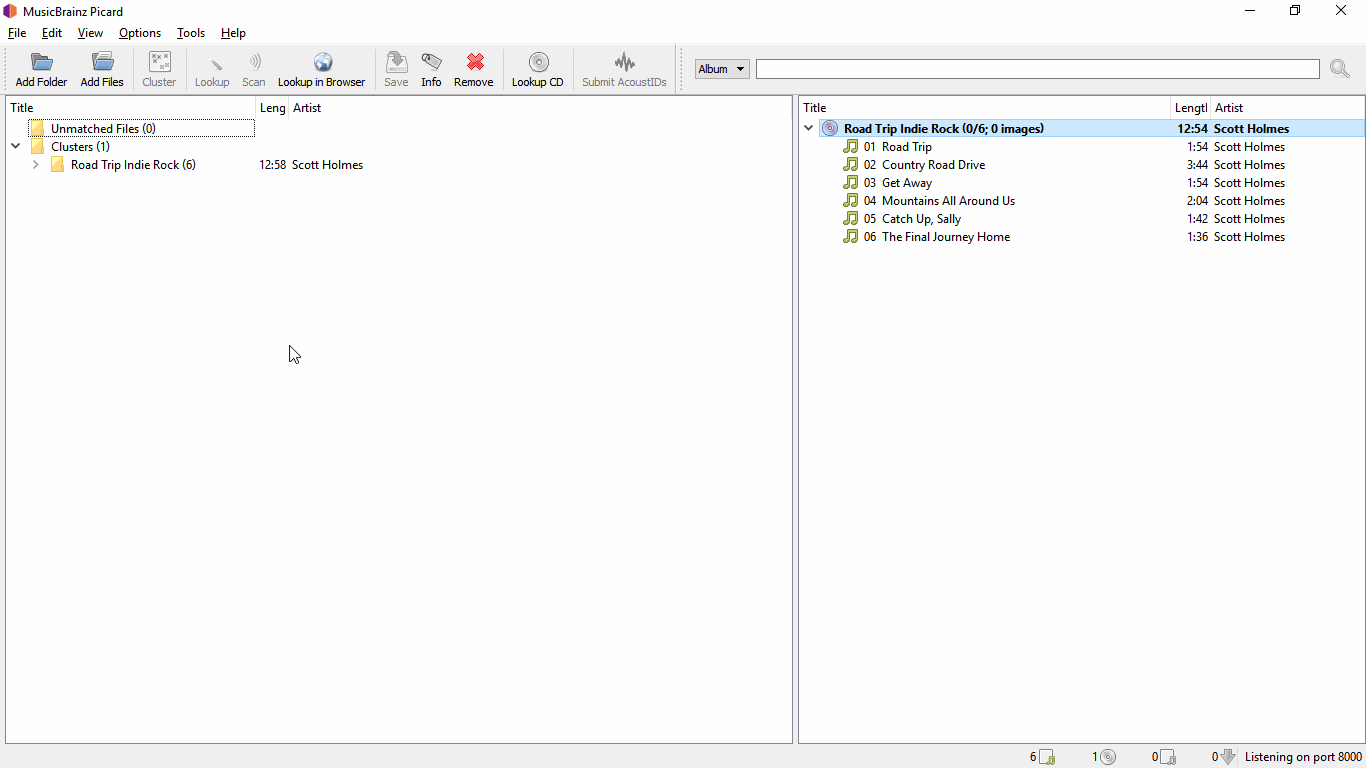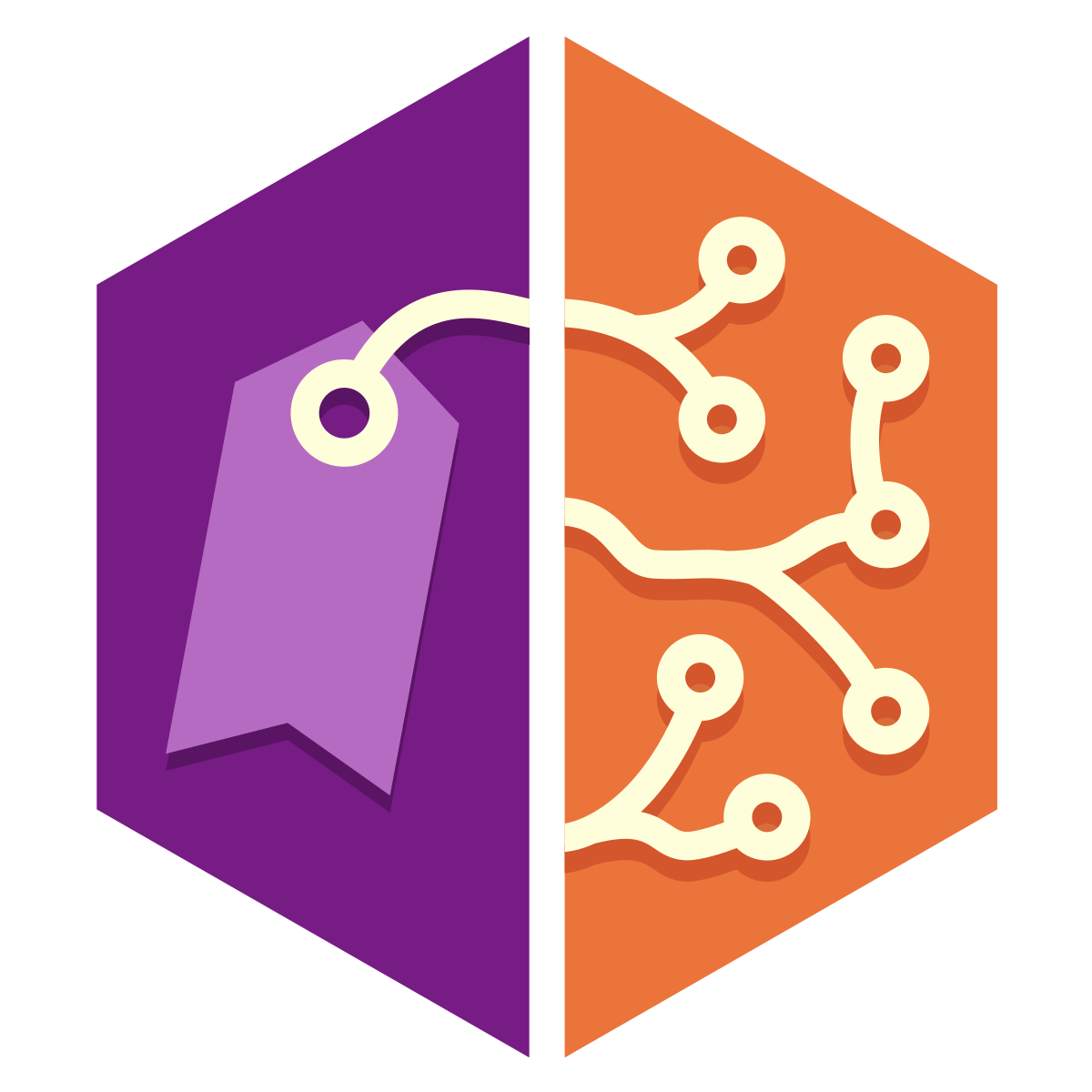It's not THAT intuitive and it took me a while to use it properly, so I thought I'd help along the next person who'd like to mass tag their file and benefit from my learnings. You can get MusicBrainz Picard here. So far I have tagged 6700 files in a few days. The right side column shows albums from the musicBrainz web site. Allows tagging files using data from MusicBrainz. Features: Fetches data by automatically calculated MusicBrainz Disc ID, existing Artist/Album or MusicBrainz Album ID tags; Uses the latest version of MusicBrainz web service, which corresponds to the NGS data model.
MusicBrainz Picard 2.5.5 running in the KDEdesktop environment | |
| Developer(s) | MusicBrainz |
|---|---|
| Stable release | |
| Repository | |
| Written in | Python |
| Operating system | Linux, macOS, Windows |
| Type | tag editor, acoustic fingerprinter |
| License | GPL 2 or later |
| Website | picard.musicbrainz.org |
MusicBrainz Picard is a free and open-sourcesoftware application for identifying, tagging, and organising digital audio recordings.[3] It was developed by the MetaBrainz Foundation, a non-profit company that also operates the MusicBrainz database.
Picard identifies audio files and Compact Discs by comparing either their metadata or their acoustic fingerprints with records in the database.[3] Audio file metadata (or 'tags') are a means for storing information about a recording in the file. When Picard identifies an audio file, it can add new information to it, such as the recording artist, the album title, the record label, and the date of release.[4] In some cases, it can also add more detailed information, such as lists of performers and their instruments. The source of this information is the MusicBrainz database, which is curated by volunteers. The more information the database has about a recording, the more Picard can embed in users' audio files.
MusicBrainz Picard has tag editing features, and is extensible with plug-ins. It is named for Captain Jean-Luc Picard, a character in the US television series Star Trek: The Next Generation.
Development[edit]

Picard began as a tag editor called the MusicBrainz Tagger, which was the work of MusicBrainz founder Robert Kaye and other volunteers. It was developed in the Python programming language, and ran only on Microsoft Windowsoperating systems.
This early incarnation of the program could identify songs based on tags or MusicDNS acoustic fingerprints. However, Kaye saw that it needed cosmetic and functional improvements.[5]Streaming media company RealNetworks took an interest in MusicBrainz, and gave the developers a grant to improve the Tagger software.[5]
As a sponsor of the development project, RealNetworks asked Kaye to come up with a project code name.[5] Since Kaye was trying to make a 'next-generation tagger', he thought of the science fiction television series Star Trek: The Next Generation, in which Patrick Stewart plays the role of Captain Jean-Luc Picard.[5] Although Kaye intended the name Picard to be temporary, MusicBrainz Picard remains the official name of the program.[5]

With funding from RealNetworks, MusicBrainz developers designed a new user interface for Picard. When the new software identified tracks, it grouped them by album in a collapsible tree view. The developers also switched from a software library called wxPython to another called PyQt, and ported Picard to the operating systems Linux and macOS.
In 2009, Picard's developers replaced the MusicDNS acoustic fingerprinting system with AcoustID.
In 2017, Picard's development resumed, led by Sambhav Kothari.[6][7] Progressing at a rapid pace, its back-end underwent a lot of changes, along with the switch to Python 3, PyQt5 and a new and improved UI.[8] Picard's development version was also made available on PyPi, supporting Windows, Linux and macOS.[8]
Supported file formats[edit]
Picard supports these audio file formats:[9]
| Audio file format | Data compression | Metadata container |
|---|---|---|
| AAC | Lossy | iTunes MP4 |
| Apple Lossless | Lossless | iTunes MP4 |
| FLAC | Lossless | Vorbis comment |
| Monkey's Audio | Lossless | APEv2 tag |
| MP3 | Lossy | ID3 |
| Musepack | Lossy | APEv2 tag |
| Ogg Vorbis | Lossy | Vorbis comment |
| OptimFROG | Lossless | APEv2 tag |
| Opus | Lossy | Vorbis comment |
| Speex | Lossy | Vorbis comment |
| TTA | Lossless | ID3 |
| WAV | Lossless | N/A |
| WavPack | Lossless | APEv2 tag |
| Windows Media Audio | Both | ASF |
References[edit]
Musicbrainz Picard Alternative

- ^'Picard 2.6 released'. MusicBrainz/MetaBrainz blog. Retrieved 2 April 2021.
- ^'Picard News'. GitHub. Retrieved 2 April 2021.
- ^ abStaff writer (28 July 2011). 'MusicBrainz Picard at a Glance'. PC World. IDG Consumer & SMB. Retrieved 14 September 2015.
- ^Lightner, Rob (11 June 2012). 'Tag your music files correctly with MusicBrainz Picard'. CNET. CBS Interactive. Retrieved 14 September 2015.
- ^ abcdeKaye, Robert (10 December 2012). Robert Kaye of MusicBrainz. Music Tech Talks. London: Music Tech Fest. Retrieved 21 April 2017 – via YouTube.
- ^'Picard 1.4 released'. MusicBrainz/MetaBrainz blog.
- ^'Community Recap Q1 2017'. MusicBrainz/MetaBrainz blog.
- ^ ab'Picard 2.0 dev available via PyPi'. MusicBrainz/MetaBrainz blog.
- ^'MusicBrainz Picard FAQ § File Formats'. Retrieved 15 September 2015.
External links[edit]
| Wikimedia Commons has media related to MusicBrainz Picard. |
- MusicBrainz Picard entries in the MusicBrainz Blog
Whether you have a small or large collection of music files, they always seem to contain incorrect tags, misspellings and otherwise incorrect information. MusicBrainz Picard completely simplifies the automation of tagging and renaming your collection of music files.
To start off, MusicBrainz Picard supports a number of different music files including the two most popular: FLAC and MP3.
The utility of Picard is very useful and allows you to organize your music collection in a mostly automated way. It supports something called AcoustID which works in a somewhat similar way to Shazam. Once files are identified by MusicBrainz Picard, you can go ahead and batch rename and tag files based on the information it has gathered.
On top of actually taking a sample of the music file to gather information, MusicBrainz Picard can also gather information from the existing metadata present in files.
Everything that MusicBrainz Picard does is customizable and you can have it rename your entire MP3/FLAC collection based on the actual content of the file.
There is a little bit of a learning curve due to the program layout and use of more advanced automation so we'd suggest playing around with a few sample files until you're comfortable with it.
In conclusion, MusicBrainz Picard is an awesome application which can really help you better organize your music collection.
MusicBrainz Picard can batch modify ID3 tags and automatically tag MP3 files.

Features and highlights
- Supports all popular music formats, including MP3, FLAC, OGG, M4A, WMA, WAV, and more
- Uses AcoustID audio fingerprints, allowing files to be identified by the actual music
- Can lookup entire music CDs with a click
MusicBrainz Picard 2.6.1 on 32-bit and 64-bit PCs

This download is licensed as freeware for the Windows (32-bit and 64-bit) operating system on a laptop or desktop PC from mp3 tagging software without restrictions. MusicBrainz Picard 2.6.1 is available to all software users as a free download for Windows. As an open source project, you are free to view the source code and distribute this software application freely.
Filed under:Picard Musicbrainz Tutorial
- MusicBrainz Picard Download
- Freeware MP3 Tagging Software
- Open source and GPL software
- Major release: MusicBrainz Picard 2.6
- Tag Editing Software

Comments are closed.